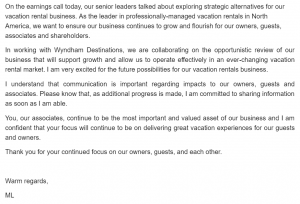Last year, as Wyndham Worldwide split into two publicly traded companies, Wyndham Hotel and Resorts (NYSE: WH) and Wyndham Destinations (NYSE: WYND), and announced that it had sold its market-leading European vacation rental businesses for $1.3 billion, industry observers wondered how long it would take before the company would search for a strategic alternative for its North American vacation rental business.
The answer? One year.
“We announced this morning that we are exploring strategic alternatives for our vacation rental business, the leader in professionally managed vacation rentals in North America,” said Michael Brown, president and CEO, Wyndham Destinations, in today’s earnings call.
Brown continued, “This is a great business with a collection of distinctive brands and a diversified national footprint. This opportunistic review is intended to allow us, over time, to more fully focus on other aspects of our company that are at the core of Wyndham Destinations’ identity. We will not be commenting in detail today on the next steps other than noting it is a full review of all value-creation alternatives. We hope to have more to share in the near future.”
Wyndham’s North American vacation rental business is the second largest vacation rental management provider in the US and includes 9,000 units in traditional vacation rental destinations, including beach communities in Delaware, North Carolina, South Carolina, Florida, and Alabama, and mountain communities in Colorado, British Columbia, Utah, Idaho, and Tennessee.
Just two months ago at the Phocuswright Conference, we asked Wyndham Vacation Rentals vice president Lino Maldonado, “What do you think you learned from the European sale, and do you think that we will see a spin off of the North American Vacation Rental businesses, as well?
Maldonado replied, “That is a loaded question for a number of different reasons that, unfortunately, I can’t get too deep into. Our European business was a very different model than the US model. It’s more like a listing model in many cases, and the public-facing statements on why this spin off occurred have spoken for themselves. What happens in the US? Consolidation is absolutely prime right now. We’ve been in a different sort of focus mode with separating one large company to two publicly-traded separate companies. We’re just coming out of the dust settling from that.”
When asked if Wyndham Vacation Rentals would be more acquisitive in 2019, Maldonado responded, “We have quite the pipeline. That’s one of my areas of responsibility at the company, and we have quite a good pipeline sitting on the desk ready to get into our next mode.”

Fast forward to today’s announcement when Brown was asked about what prompted the review of the vacation rental segment, he replied, “The reality is prior to the separation we began to just talk about what’s the best way to integrate this into Wyndham Destinations. We began to really look at where the synergies could lie not only cost synergies but revenue synergies. And again, with three huge transactions happening together, La Quinta, European Rentals, and the separation of the two entities, it wasn’t the right time to make a thoughtful decision.”
Brown continued, “So we’ve actually been looking at what was the right strategic fit for the vacation rental business for almost a year now. It’s only in the last few months that we’ve decided to put it through a strategic review alternatives to really look at how to maximize the value of this business. And we’ll see where that review takes us. But it’s a great business. It’s that 9,000 units in North America. And the timing of it simply is a matter of when–as the new Wyndham Destinations, we felt coming out of the gate, it was the right time to do that proper review.”
Wyndham CFO Michael Hug also weighed in, “I do really like this business. And if you were to go back to our separation with three large transactions happening at the same time (we have the separation of the company, the acquisition of La Quinta and the sale of the European rental business), we really wanted the opportunity to evaluate all strategic alternatives post spin, because there are some real natural synergies between the vacation ownership and exchange business and the vacation rental business. And that’s why we wanted to have a thoughtful chance to evaluate it instead of in a rush fashion. And that’s really the process that we are in at the moment.”
Hug added, “We will review all strategic alternatives and make the right decision at the end of our process to determine what ultimate action we’re going take. This is an opportunistic review and we think it’s the right time early in Wyndham Destinations’ life cycle to have this review.”
Potential Alternatives
Last year, while looking for a buyer for Wyndham’s European vacation rental businesses, in addition to Platinum Equity (who won the bid), there were at least two other qualified buyers at the table who had performed due diligence and had put together plans for the transition and long-term success. According to multiple sources, Airbnb was a part of one bid for the company, while another included an equity-backed team of seasoned vacation rental operators, experts and analysts.
And then there is Vacasa, which has been teasing an IPO. Keeping in mind that former Wyndham Vacation Rentals president Bob Milne currently serves as COO at Vacasa, could we see a Wyndham-Vacasa-mashup IPO? Or even a PE-funded Wyndham-Vacasa-TurnKey roll up?
Let the speculation begin.



As the Vacasa’s and Airbnb’s of the VR world attempt to broaden their revenue bases (new resorts?), while at same time cities nationwide seem to be constraining VR unit growth, what is the impact on the macro supply of new units. Are new VR units being added to the collective rental pools equal in pace as the demand expands? Is there a shortfall in new VR inventory? If so, there must be upward sloping revenue for the unit owners. Quantitatively, how much is market value enhanced by revenues to the owner/investor/family? Who is building new inventory? Is new inventory one home at a time, or concentrated in ‘resorts’ friendly toward vacation rentals?